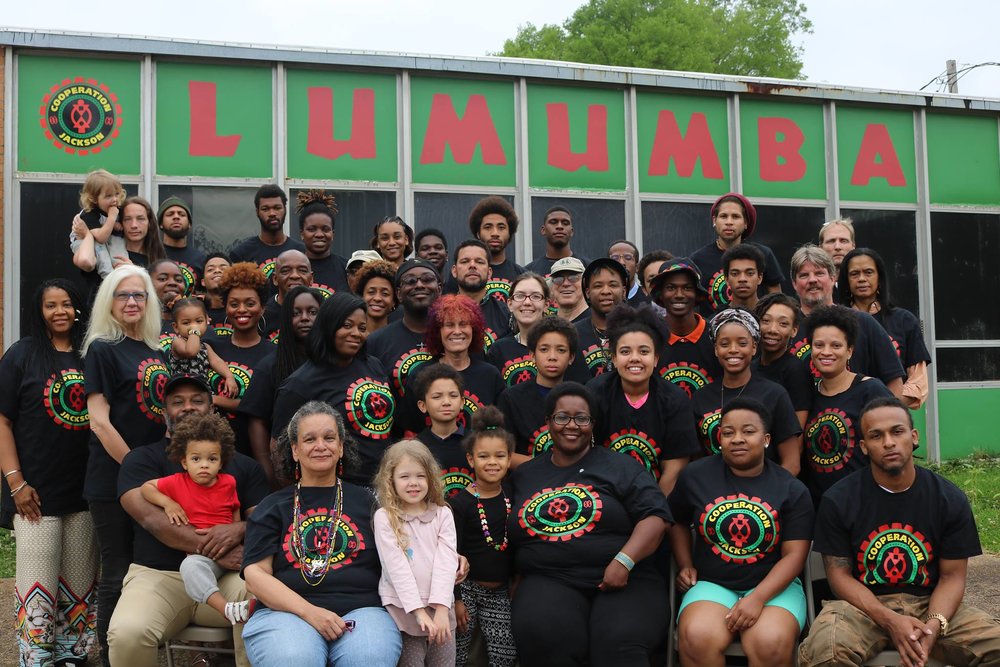Launched on 1 May 2014, Cooperation Jackson is a libertarian-ecosocialist and predominantly Black-led network of worker cooperatives in Jackson, Mississippi.
“The broad mission of Cooperation Jackson is to advance the development of economic democracy in Jackson, Mississippi by building a solidarity economy anchored by a network of cooperatives and other types of worker-owned and democratically self-managed enterprises.”[1]
Cooperation Jackson employs a strategy of dual power, building autonomous institutions that can challenge and eventually replace the state’s. The organization seeks to exploit the fact that the capitalist system has left the overwhelmingly Black city of Jackson impoverished and minimally industrialized. Cooperation Jackson seeks to implement, according to co-founder Kali Akuno, “sustainable, community driven and controlled development without displacement.”[2]
As of 2019, Cooperation Jackson ran three worker cooperatives: (1) Freedom Farms, which grows organic vegetables for communal distribution and sale at farmers’ markets, (2) the Center for Community Production which runs a printshop, and (3) the Green Team which does lawn care and composts the clippings.[3] In addition, they operated the Fannie Lou Hammer Community Land Trust which acquired land to fight gentrification and to eventually establish a residential eco-village.[4] By 2021, Cooperation Jackson had acquired about 50 vacant properties.[5]
Cooperation Jackson facilitates communal decision-making through People’s Assemblies which they define as “mass gathering[s] of people organized and assembled to address essential social issues and/or questions pertinent to a community.” Cooperation Jackson envisions assemblies taking place at the local, delegates’, and coalition levels, with each assembly making decisions by “some type of majoritarian voting procedures or consensus.”[6]
Cooperation Jackson’s website includes news updates and contact and donation information.[7]
Organizational and Philosophical Roots
Cooperation Jackson traces much of its project’s lineage to the New Afrikan People’s Organization (NAPO). Expressing support for anti-colonial, Puerto Rican, and native American struggles against U.S. empire, NAPO advocated “an independent nation state for New Afrikans” in what’s now South Carolina, Georgia, Alabama, Mississippi, and Louisiana. Through the slogan “Free the Land,” NAPO advocated seizing land from the capitalist class’s ownership.[8]
Between 2004 and 2010, members of NAPO and the Malcolm X Grassroots Movement (MXGM) co-authored the Jackson-Kush Plan envisioning the establishment of Cooperation Jackson.[9] The Jackson-Kush Plan was published in 2012.
Transcending NAPO’s traditionally nationalist stance, Cooperation Jackson embraced a libertarian strategy that Kali Akuno summarizes: “We are clear that self-determination expressed as national sovereignty is a trap if the nation-state does not dislodge itself from the dictates of the capitalist system […] We are clear that economic democracy and the transition to eco-socialism have to come from below, not from above.”[10]
Cooperation Jackson is deeply influenced by Black nationalism and various eco- and libertarian socialist philosophies such as Anarchism, Syndicalism, neo-Zapatismo,and the Mondragon Principles. Exemplifying the organization’s Anarchist influence, Cooperation Jackson operates a cooperative incubator called the “Balagoon Center (named for Kuwasi Balagoon, a queer tenant organizer, anarchist and Black Panther.”[11] Moreover, Akuno writes that the organization eventually aims “to create a class and community oriented syndicate, one big union,” and includes an endnote citing Daniel De Leon, Rudolf Rocker, and Noam Chomsky on syndicalism.[12]
Electoralism and Municipal Government
When Chokwe Lumumba, co-founder of both MXGM and NAPO, ran for mayor in 2013’s Democratic Party primary, he had the strong support of these organizations which were helping to build Cooperation Jackson. Upon winning the election, Lumumba used the People’s Assemblies to gain support for a 1 percent sales tax to fund infrastructure fixes. The proposal passed with 90 percent of voters in favor. Akuno and other co-founders of Cooperation Jackson worked closely with Lumumba’s administration. However, within eight months of taking office, Lumumba died of a heart attack in February 2014.[13]
In 2017, Lumumba’s son Chokwe Antar was elected mayor. Akuno has commented on his and the grassroots’ relationship with the Antar’s administration:
“Let it also be known that while I disagree with many of the policy and programmatic priorities articulated by the Mayoral administration of Chokwe Antar Lumumba thus far, as well as Mayor Lumumba’s increasing public alignment with the Democratic Party (particularly the so-called Bernie wing of the Party), I have a vested interest in doing all that I can to help the Lumumba administration succeed. I am committed to struggling with the administration internally where possible and externally when necessary, to stay the course of pursuing radical social transformation as articulated in the Jackson-Kush Plan.”[14]
Akuno regrets the extent to which electoral work has eclipsed building autonomous power:
“As a result of this compromise, winning elections became the primary focus of the ‘on the ground’ work in Jackson from 2009 on. In practice this election centered focus has translated into downplaying the politics of the New Afrikan Independence Movement, limiting public discussion of the Jackson-Kush Plan, crafting a more ‘popular’ political platform called the ‘people’s platform’ that orientated itself towards the restitution of a welfare state as opposed to the construction of socialism, and making public overtures to appease capital expressed in statements that ‘Jackson is open for business’ and ‘we want corporations to come here and get rich’. All of these moves were made to enable the candidates to become more ‘electable’.”[15]
Source: Anarchy in Action
